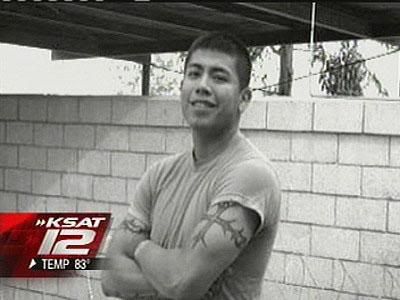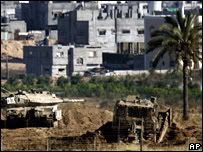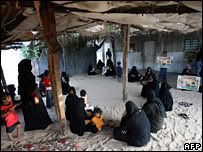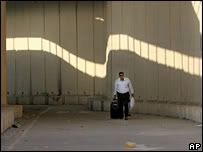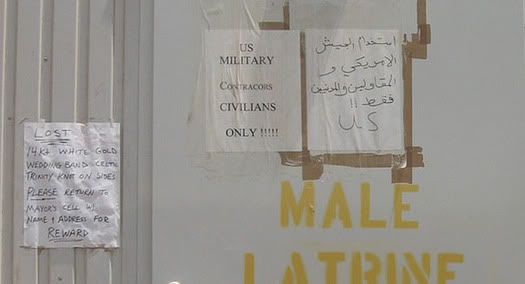The U.S. Army does not have enough evidence for murder charges against a U.S. soldier accused of killing a wounded Iraqi near Kirkuk, a military official ruled.
Lt. Col. Raul Gonzalez has recommended aggravated assault instead of murder charges be lodged against Spc. Christopher P. Shore, the Atlanta Journal-Constitution reported Wednesday.
During a hearing in Hawaii, Shore said his commanding officer, Sgt. 1st Class Trey A. Corrales, ordered him to "finish" a detainee who was on the ground bleeding, the newspaper said. The man died two days later.
Gonzalez, the presiding officer investigating the case, said evidence indicated Corrales -- not Shore -- shot and hit the victim multiple times with an M-4 rifle and displayed intent to kill.
Furthermore, Gonzalez said Corrales created an "unhealthy environment" for his platoon via his "abusive" and "unlawful" behavior, the newspaper said.
Shore, home in Winder, Ga., on leave, told the Journal-Constitution he was relieved by the decision.
"I think the man did the right thing," he said.
Wednesday, November 07, 2007
Another Day, Another War Crime Swept Under a Rug
Saturday, September 29, 2007
U.S. Sniper Acquitted of Murder, Convicted of Planting Evidence in Iraq
The Boston Globe reports:
A military panel acquitted US Army Specialist Jorge G. Sandoval of two counts of murder yesterday, apparently swayed by testimony from fellow Army snipers that two Iraqi men were killed on orders from a higher-ranking soldier.
Sandoval was convicted of a less serious charge of planting detonation wire on one of the bodies to make it look like the victim was an insurgent. As a result, he still could face five years in prison. The seven-member jury deliberated less than two hours in clearing him of all but one charge.
Sandoval, 22, of Laredo, Texas, had faced five charges in the deaths of the two unidentified Iraqi men.
In dramatic testimony during the two-day court-martial, Sandoval's colleagues testified they were following orders when they shot the men during two separate events, on April 27 and May 11. The shootings took place near Iskandariyah, a volatile Sunni-dominated area 30 miles south of Baghdad.
Specialist Alexander Flores, of Hayward, Calif., who was in the same squad as Sandoval on the day of the April killing, testified their platoon leader said the suspect was "our guy" and ordered them to move in, which they interpreted as "take the target out."
The suspect, who wore dark clothing and used a sickle to cut grass in a field, matched the general description Iraqi soldiers had given the Americans of one of two insurgents they had faced earlier in the day, according to testimony.
After the killing, Flores said Staff Sergeant Michael Hensley told him to place the detonation wire on the body and in the man's pocket, which he said he did.
But prosecutors cited an interview with Sandoval immediately after his arrest in which he said he planted the wire.
Outside court, Flores stood by his testimony.
"He was just doing his job, as he was told. It's not his fault," said Flores, who, along with the rest of Sandoval's sniper platoon, greeted him with hugs and well wishes.
In the May shooting, Sergeant Evan Vela said Hensley told him to shoot a man who had stumbled upon their snipers' hideout, although he was not armed and had his hands in the air when he approached the soldiers.
"He [Hensley] asked me if I was ready. I had the pistol out. I heard the word shoot. I don't remember pulling the trigger. It took me a second to realize that the shot came from the pistol in my hand," Vela testified, crying.
Sandoval, who was charged with murder because prosecutors said he did nothing to stop the killing, also was acquitted yesterday of charges he planted the weapon on the second man's body.
Vela of Rigby, Idaho, and Hensley of Candler, N.C., are both charged in the case and will be tried separately.
All three soldiers are part of the 25th Infantry Division at Fort Richardson, Alaska.
So.
Friday, September 28, 2007
Making More Terrorists, Day by Day, Airstrike by Airstrike
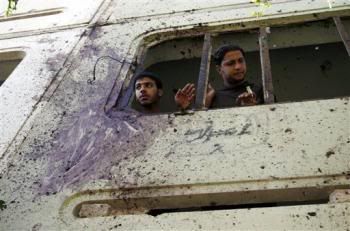 Two Iraqi men look out from a damaged window, from where the body of a civilian was recovered, at an apartment building after a U.S airstrike in the Sihha district in Dora southern Baghdad, Iraq, early Friday, Sept. 28, 2007. Iraqi police and witnesses said U.S. troops backed by helicopter gunships raided an apartment building in a primarily Sunni neighborhood in southern Baghdad on killing at list 10 civilians and wounding 12. The U.S. military said it was checking into the report. (AP Photo/Loay Hameed)
Two Iraqi men look out from a damaged window, from where the body of a civilian was recovered, at an apartment building after a U.S airstrike in the Sihha district in Dora southern Baghdad, Iraq, early Friday, Sept. 28, 2007. Iraqi police and witnesses said U.S. troops backed by helicopter gunships raided an apartment building in a primarily Sunni neighborhood in southern Baghdad on killing at list 10 civilians and wounding 12. The U.S. military said it was checking into the report. (AP Photo/Loay Hameed)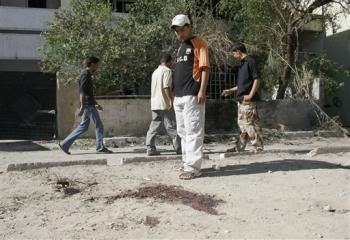
 Iraqi women react during a funeral after a U.S airstrike in the Sihha district in Dora southern Baghdad, Iraq, early Friday, Sept. 28, 2007. Iraqi police and witnesses said U.S. troops backed by helicopter gunships raided an apartment building in a primarily Sunni neighborhood in southern Baghdad on killing at list 10 civilians and wounding 12. The U.S. military said it was checking into the report. (AP Photo/Loay Hameed )
Iraqi women react during a funeral after a U.S airstrike in the Sihha district in Dora southern Baghdad, Iraq, early Friday, Sept. 28, 2007. Iraqi police and witnesses said U.S. troops backed by helicopter gunships raided an apartment building in a primarily Sunni neighborhood in southern Baghdad on killing at list 10 civilians and wounding 12. The U.S. military said it was checking into the report. (AP Photo/Loay Hameed )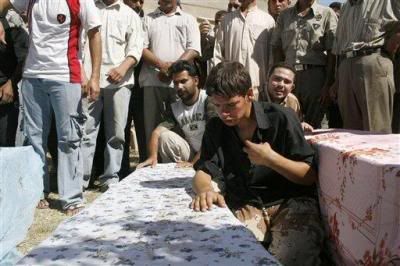 Iraqi men stand in front of three coffins during a funeral of victims after a U.S. air strike in the Sihha district in Dora southern Baghdad, Iraq, early Friday, Sept. 28, 2007. Iraqi police and witnesses said U.S. troops backed by helicopter gun ships raided an apartment building in a primarily Sunni neighborhood in southern Baghdad on killing at list 10 civilians and wounding 12. The U.S. military said it was checking into the report. (AP Photo/Loay Hameed )
Iraqi men stand in front of three coffins during a funeral of victims after a U.S. air strike in the Sihha district in Dora southern Baghdad, Iraq, early Friday, Sept. 28, 2007. Iraqi police and witnesses said U.S. troops backed by helicopter gun ships raided an apartment building in a primarily Sunni neighborhood in southern Baghdad on killing at list 10 civilians and wounding 12. The U.S. military said it was checking into the report. (AP Photo/Loay Hameed )The International Herald Tribune reports:
Iraqi police and witnesses said U.S. troops backed by helicopter gunships raided an apartment building in a primarily Sunni neighborhood in southern Baghdad on Friday, killing 10 civilians and wounding 12. The U.S. military said it was checking into the report.
An unknown number of people also were detained after the 2 a.m. incident in the Sihha district in Dora where clashes took place between U.S. helicopters and gunmen, said a police officer who spoke on condition of anonymity because he was not authorized to release the information.
Shaheed Abdul-Al, a 42-year-old metal worker who lives in the area, said his family was awakened by the sound of helicopters, heavy gunfire and bombing.
"We saw a big spark of light with bombing sounds come from the direction of the (targeted) building," he said. "We were horrified and still awake at sunrise."
Ahmed Salim, a 16-year-old student who lives near the targeted complex, said he saw U.S. military vehicles through his window.
"When the Americans left, I and others rushed to the site where people began to rescue victims," he said. "I saw some injured ones and dead bodies."
In violence north of Baghdad, at least six people were killed when four gunmen with long beards wearing military uniforms barged into a busy cafe late Thursday as people were playing a popular game to celebrate the end of the dawn-to-dusk fast during the Islamic holy month of Ramadan.
The men arrived in a Russian-made military vehicle used by the Saddam Hussein-era army and opened fire, shouting, "God is great," according to a provincial police officer who asked that his name not be used for fear of reprisals.
The six killed included three off-duty police officers and eight other people were wounded, the officer said.
The attack occurred in Sadiyah, a town some 95 kilometers (60 miles) north of Baghdad in the volatile Diyala province.
Thursday, September 27, 2007
Sniper Describes Killing Captive
The New York Times reports:
An Army sniper is taught to kill people “calmly and deliberately,” even when they pose no immediate danger to him. “A sniper,” Army Field Manual 23-10 goes on to state, “must not be susceptible to emotions such as anxiety or remorse.”
But in a crowded military courtroom seemingly stunned into silence on Thursday, Sgt. Evan Vela all but broke down as he described firing two bullets into an unarmed Iraqi man his unit arrested last May.
In anguished, eloquent sentences, Sergeant Vela, a member of an elite sniper scout platoon with the First Battalion, 501st Infantry Regiment, quietly described how his squad leader, Staff Sgt. Michael A. Hensley, cut off the man’s handcuffs, wrestled him to his feet and ordered Sergeant Vela, standing a few feet away, to fire the 9-millimeter service pistol into the detainee’s head.
“I heard the word ‘Shoot,’” Sergeant Vela recalled. “I don’t remember pulling the trigger,” he said. “I just came through and the guy was dead, and it just took me a second to realize the shot had come from the pistol.”
Then, Sergeant Vela said, as the man, a suspected insurgent, convulsed on the ground, Sergeant Hensley kicked him in the throat and told Sergeant Vela to shoot him again. Sergeant Vela, who is not on trial but faces murder charges in connection with the killing, said he fired a second time.
His testimony on Thursday, in the court-martial of Specialist Jorge G. Sandoval Jr., another sniper who is accused of murder, provided a glimpse into the dark moments of a platoon exhausted, emotionally and physically, by days-long missions in the region south of Baghdad that soldiers call the “triangle of death.” In their testimony, Sergeant Vela and other soldiers described how their teams were pushed beyond limits by battalion commanders eager to raise their kill ratio against a ruthless enemy.
During a separate hearing here in July, Sgt. Anthony G. Murphy said he and other First Battalion snipers felt “an underlying tone” of disappointment from field commanders seeking higher enemy body counts.
“It just kind of felt like, ‘What are you guys doing wrong out there?’” he said at the time.
That attitude among superiors changed earlier this year after Sergeant Hensley, an expert marksman, became a team leader, according to soldiers’ testimony. Though sometimes unorthodox, soldiers said, Sergeant Hensley and other snipers around him began racking up many more kills, pleasing the commanders.
Soldiers also testified that battalion commanders authorized a classified new technique that used fake explosives and detonation wires as “bait” to lure and kill suspected insurgents around Iskandariya, a hostile Sunni Arab region south of Baghdad.
As their superiors sought less restrictive rules of engagement — to legalize the combat killing of anyone who made a soldier “feel threatened,” for example, instead of showing hostile intent or actions — the baiting program, as it was known, succeeded in killing more Iraqis suspected of being terrorists, soldiers testified.
But testimony in proceedings for Sergeant Hensley and, on Thursday, for Specialist Sandoval, both of whom face murder charges in connection with separate killings of Iraqi men last spring, suggest that as the integrity of the battalion’s secret baiting program began to crack, so did Sergeant Hensley.
Only a select group of snipers in the battalion were told of the program, but many more were ordered, without explanation, to carry the baiting items on missions, creating rumors that the items were intended to be planted on victims of unjustified killings, soldiers testified.
Sergeant Hensley, according to several snipers, added to such suspicions when he told a junior member of his team to plant a roll of copper wire — clear contraband — on a suspected insurgent that Specialist Sandoval killed on April 27 after being authorized to shoot by his platoon commander.
On a separate mission two weeks earlier, Sergeant Hensley had killed another Iraqi man he said appeared to be “laying wire” near an irrigation ditch, as the man’s wife and children worked and played nearby.
Then on May 11, Sergeant Vela killed the unarmed man. Afterward, as he testified Thursday, Sergeant Hensley pulled an AK-47, a weapon favored by insurgents, out of his pack and placed it on the body, telling his team that the gun would “say” what happened.
Specialist Sandoval’s court-martial on murder charges began here on Wednesday, and is scheduled to conclude Friday. Sergeant Hensley’s court-martial on murder charges is scheduled to begin here Oct. 22.
An evidentiary hearing for Sergeant Vela, who took the stand on Thursday in the Sandoval court-martial after being granted immunity from incriminating himself in that case, is expected later this year.
Sergeant Murphy has been investigated for a killing of another Iraqi man on April 7. Prosecutors have warned two more battalion members that they are also suspected of committing possible crimes as accomplices in the murder cases.
Struggling to explain why a highly trained Army sniper unit, renowned for its lethal economy of patience and discipline, would bog down under a cloud of murder investigations, some soldiers in interviews faulted commanders for pushing units to keep their kill counts high.
Others pointed toward the outsized influence on the unit by Sergeant Hensley, who, according to other soldiers’ testimony, was dealing with two recent deaths: that of a close friend, killed in a roadside bomb, and also the suicide of his girlfriend back home.
“Staff Sgt. Hensley just continued to drive on,” said Specialist Joshua Lee Michaud, in testimony at the July hearing about the sergeant’s toughness. “Both of them didn’t even faze him.”
A trainer of snipers, Sgt. First Class Terrol Peterson, testified Thursday that the very emotions a sniper must control to do his job properly — anxiety and remorse — sometimes emerge in unexpected and painful ways. “When a sniper breaks, he breaks bad,” Sergeant Peterson said.
Tuesday, September 25, 2007
U.S. Snipers Accused of 'Baiting' Iraqis
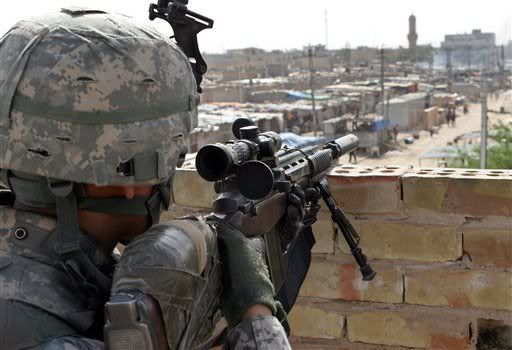 A U.S. soldier holds his sniper position on a rooftop in a Shiite enclave of Sadr City in Baghdad, Iraq, in this April file photo. Army snipers hunting insurgents in Iraq were under orders to "bait" their targets with suspicious materials, such as detonation cords, and then kill whoever picked up the items, according to the defense attorney for a soldier accused of planting evidence on an Iraqi he killed. (AP photo)
A U.S. soldier holds his sniper position on a rooftop in a Shiite enclave of Sadr City in Baghdad, Iraq, in this April file photo. Army snipers hunting insurgents in Iraq were under orders to "bait" their targets with suspicious materials, such as detonation cords, and then kill whoever picked up the items, according to the defense attorney for a soldier accused of planting evidence on an Iraqi he killed. (AP photo)The New York Times reports:
Under a program developed by a Defense Department warfare unit, Army snipers have begun using a new method to kill Iraqis suspected of being insurgents, using fake weapons and bomb-making material as bait and then killing anyone who picks them up, according to testimony presented in a military court.
The existence of the classified “baiting program,” as it has come to be known, was disclosed as part of defense lawyers’ efforts to respond to murder charges the Army pressed this summer against three members of a Ranger sniper team. Each soldier is accused of killing an unarmed Iraqi in three separate shootings between April and June near Iskandariya, and with planting “drop weapons” like detonation wires or other incriminating evidence on the bodies of the victims.
In sworn statements, soldiers testifying for the defense have said the sniper team was employing a “baiting program” developed at the Pentagon by the Asymmetrical Warfare Group, which met with Ranger sniper teams in Iraq in January and gave equipment to them.
The Washington Post described the baiting program on Monday.
An Army spokesman, Paul Boyce, said Monday that the Army did not publicly discuss specific methods for “targeting enemy combatants,” and that no classified program authorized the use of “drop weapons” to make a killing appear justified. Army officers involved in evidentiary hearings in Baghdad in July did not dispute the existence or use of a baiting program.
The court-martial of one accused soldier, Specialist Jorge G. Sandoval Jr., is scheduled to begin in Baghdad on Wednesday. The two other soldiers facing premeditated murder charges are Staff Sgt. Michael A. Hensley, the sniper team squad leader, and Sgt. Evan Vela. All three are part of the headquarters of the First Battalion, 501st Infantry Regiment, Fourth Brigade (Airborne), 25th Infantry Division, based at Fort Richardson, Alaska.
None of the soldiers deny that they killed the three Iraqis they are charged with murdering. Through their lawyers and in court documents, the soldiers say the killings were legal and authorized by their superiors. But defense lawyers raised the issue of the baiting program in response to prosecutors’ allegations that the soldiers had planted items, like wire for making bombs, on the bodies of the victims.
A transcript of the hearing was provided by a family member of an accused soldier.
Snipers are among the most specialized of soldiers, using camouflage clothing and makeup to infiltrate enemy locations, and high-powered rifles and scopes to stalk and kill enemy fighters. The three snipers accused of murder had for months ventured into some of the most dangerous areas of Iraq, said lawyers for Sergeant Vela.
“Snipers are special people who are trained to shoot in a detached fashion, not to see their targets as human beings,” said James D. Culp, one of Sergeant Vela’s lawyers. “Snipers have split seconds to take shots, and he had a split second to decide whether to shoot.”
After visiting the sniper unit in Iraq, members of the Asymmetrical Warfare Group gave soldiers ammunition boxes containing so-called “drop items” like bullets, plastic explosives and bomb detonation cords to use to pinpoint Iraqis involved in insurgent activity, according to Capt. Matthew P. Didier, a sniper platoon leader who gave sworn testimony in the accused soldiers’ court hearings.
Captain Didier, in a sworn statement about the program that was obtained by The New York Times, described baiting as “putting an object out there that we know they will use, with the intention of destroying the enemy.”
After placing the bait, snipers observed the area around it, Captain Didier said in his statement. “If someone found the item, picked it up and attempted to leave with the item,” he said, “we would engage the individual, as I saw this as a sign that they would use the item against U.S. forces.” (Engage is a military euphemism for firing on or killing an enemy.)
The Asymmetrical Warfare Group, based at Fort Meade, Md., grew out of a task force created after the American invasion of Iraq in 2003 to develop methods to defeat roadside bombs. Not all of the group’s tactics were meant for sniper units, and most of them have not been publicly disclosed.
For instance, the group last year advised “kill teams” from the Third Brigade, Second Infantry Division, to dig holes resembling those used by insurgents to hide roadside bombs, and to shoot Iraqis who tried to place things in the holes, said a soldier who was briefed on the program and who spoke on condition of anonymity to avoid retribution.
The kill teams used the tactic not to kill people, but to wound them with gunshots and then capture and interrogate them, the soldier said. “It’s pretty common, and it’s pretty effective,” the soldier said in an interview. The soldier lamented the disclosure of the baiting and other anti-insurgent combat tactics because “it’s probably saving a lot of soldiers’ lives.”
James Ross, the legal and policy director for Human Rights Watch, said using fake weapons and ammunition as bait to attract and kill insurgents creates blurry ethical boundaries for soldiers fighting in Iraq, and great risk to civilians who are not legal targets in war. International law recognizes that killing “any individual who is directly or indirectly taking part in hostilities” can be justified, Mr. Ross said, but it is not precise about how such distinctions should be applied.
Mr. Ross said the dispersal of ammunition and explosives by American forces as part of an effort to attract insurgents would present obvious human rights problems.
“It seems to me that there are all sorts of reasons that civilians would want to pick up ammunition that is sitting on the ground,” he said.
Specialist Sandoval is the first of the three suspects to be tried in a court-martial. He and Sergeant Hensley were accused of leaving a spool of wire that could be used to detonate roadside bombs in a pocket of the man whom Specialist Sandoval shot in April, on Sergeant Hensley’s command.
Thursday, September 20, 2007
Life These Days in Gaza
The BBC's Middle East editor, Jeremy Bowen:
The other week, I sat in Gaza City with Raji Sourani, the director of the Palestinian Centre for Human Rights (PCHR).
It was a hot Gaza day, the summer was winding down to the holy month of Ramadan, and outside his office not much was moving on the street.
Why should it? The economy of the Gaza Strip is in a state of collapse. The jobs that are left - and they are few - are disappearing.
Since the militant group Hamas used force to drive out its rivals, Fatah, in June, the crossing used for the passage of goods between Gaza, Israel and the outside world has been closed.
Around 1.4 million people live in the Gaza Strip. Some 1.1 million of them receive UN food rations.
For many Palestinians, it is ironic that President Abbas will talk to representatives of the Israeli government, but not to anyone from Hamas
Israel, like most of its Western allies, regards Hamas as an unreconstructed terrorist organisation bent on the destruction of the Jewish state and believes that embargo and isolation are good ways of dispatching it to the dustbin of history.
Fatah, the other main Palestinian faction, also wants pressure on Hamas kept up.
Publicly, Fatah protests about what the embargo does to Gaza's people, privately it gives tacit approval.
For many Palestinians, it is ironic that their President, Mahmoud Abbas, will talk to representatives of the Israeli government, but not to anyone who comes from the Islamist group which won a democratic election in January 2006.
Collective punishment
Raji Sourani and I discussed all of that. Then he spoke about some orange groves his family owned.
Even though Gaza is one of the most crowded places in the world, there is a surprising amount of open agricultural land.
Mr Sourani spoke of how on hot days like the one that was sweltering all around us, they would picnic in the shade of the trees.
They could not do it anymore, he said, because Israeli bulldozers had crossed into Gaza and flattened the orange groves.
A wide strip of land along the border has been cleared, Israel says for security reasons, so its soldiers can spot Palestinian militants who want to kill Israelis.
Many Palestinians say that reasons of security can also be a cover for the collective punishment of property owners.
'Worse things happen'
I was expecting Mr Sourani to talk about the pain of losing something that was full of family memories.
He said it did hurt. But he also described the way that his elderly mother, to all and intents and purposes, had told her family to pull themselves together.
Listen, she said, they were only trees. They have gone, but they can grow again.
The important thing, she told them, is that none of you are dead.
Now, what is the point of writing about all this?
As Mr Sourani's mother said, many worse things happen in Gaza. Violent death is part of everyone's life.
Later the same day, I went to the home of a family that was mourning three children, two boys aged 10 and 12, and a 12-year-old girl.
The young cousins were mistakenly killed by Israeli soldiers last month because they were playing close to rocket launchers outside Beit Hanoun.
I suppose I am mentioning Mr Sourani's mother because she displays not just a commendable sense of proportion, but also a capacity to endure. You won't get far without it in Gaza.
Israeli frustration
They need it too on the other side of the border wire in the southern Israeli town of Sderot, which is regularly rocketed from Gaza.
A couple of days after I met Mr Sourani, a rocket landed close to the town's nursery school.
Very fortunately, nobody was hurt in that attack. But it filled many Israelis who saw television pictures of terrified infants with rage and frustration.
Newspaper columnists asked what Israel would be doing if the children in the Sderot nursery school had been killed (their answer: re-invading Gaza) and angrily rejected the idea that Israel's policy should be dictated by the kill-rate of Palestinian rockets.
That started calls to find a way to punish Gazans for allowing rockets to be fired at Israel, which deepened after more than 60 Israeli soldiers were hurt in another attack.
This week, the Israeli government produced its answer.
It decided to classify Gaza a "hostile entity", and, pending a legal review, to reserve the right to impose collective punishments by cutting supplies of fuel and electricity, and by restricting the movement of people.
'Big prison'
Gaza's new status institutionalises methods that Israel is already using to ratchet up the pressure.
UN Secretary General Ban Ki-moon asked Israel to reconsider.
He said Gaza's people "should not be punished for the unacceptable actions of militants and extremists".
The Palestinians to whom I have spoken ask what is new.
For years, they have routinely described the Gaza Strip as a big prison and it is hard to argue with the description.
Throughout 40 years of occupation, collective punishments that violate the fourth Geneva Convention have been commonplace.
Echoing terminal
In Gaza today, supplies of everything are in short supply because of existing Israeli restrictions, and the movement of Palestinians into and out of the territory has already almost ceased.
Israel has built an enormous border terminal with sophisticated layers of security that culminate with a full body scan.
You enter a circular chamber, the doors of which hiss shut behind you.
A loudspeaker voice, owned by a person who presumably is watching what is happening on a TV monitor, tells you to stand with your legs apart and to raise your hands above your head.
Sensors spin and swoop round, looking for dangerous substances that you may have swallowed or inserted into your body.
It does not hurt - nothing touches you and if you pass scrutiny, you walk out into the echoing terminal, glacial with air conditioning, past security people who preside over a building that is almost empty because so few people can cross.
Perhaps the terminal is designed for a better time, of neighbourly relations between two states.
US friends only
And as life for Gaza's civilians becomes worse, Western politicians and diplomats have hopes that for the first time since the collapse of the Camp David summit in 2000, there could be a chance to restart peace talks.
For them, everything has become easier since Hamas took over in Gaza.
 Ms Rice has yet to address the problem that her strategy ignores both Hamas and the Syrian government - two entities who have the capacity to wreck anything the conference produces
Ms Rice has yet to address the problem that her strategy ignores both Hamas and the Syrian government - two entities who have the capacity to wreck anything the conference produces They can now deal solely with Fatah, which has set up a technocratic "government" without any Hamas participation.
The West - and the Israeli prime minister and the Palestinian Authority president - is focusing on a US plan for an international conference in November, which Secretary of State Condoleezza Rice is working towards this week as she tours the Middle East.
She has yet to address the problem that her strategy ignores both Hamas and the Syrian government - two entities who have the capacity to wreck anything the conference produces that they do not like. Only friends of the US are being invited.
An invitation arrived at Mr Sourani's office to meet the new Middle East peace envoy Tony Blair.
It would have meant going through the empty border terminal and to travel up to Jerusalem, but Mr Sourani was not granted a permit by the Israeli authorities.
He was frustrated, but he also cannot get a permit to visit his wife and children, who are in Egypt.
Guess which hurts most. As his mother said, keep everything in proportion.
Wednesday, August 08, 2007
Our Friends, The Saudis
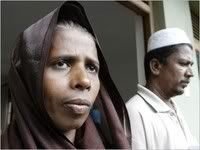
ABC News reports:
The family of a 19-year-old Sri Lankan girl is pleading for her life after a Saudi Arabian court sentenced her to death by beheading.
The court found Rizana Nafeek, 19, guilty of murdering a child in her care while working in the country. Her family (parents pictured above) has appealed the sentence, and human rights groups are calling for the Saudi government to overturn it.
At 17, Rizana Nafeek was sent to Saudi Arabia after the tsunami to work as a maid and make money for her family in Sri Lanka. But after only a few weeks and no child care training, her employers put her in charge of their 4-month-old baby. The baby died, and Nafeek was charged with murder, tried without an attorney and sentenced to death.
"This case raises many troubling questions about the treatment of children and foreigners in Saudi Arabia's criminal justice system," says Varia. "Foreigners simply do not receive the same treatment in the Saudi justice system. This includes having translation during the interrogation and during court proceedings and having an attorney."
About 1.5 million Sri Lankans work abroad, according to the country's labor statistics. Eighty percent of the women working abroad are employed as unskilled domestic workers, primarily in Saudi Arabia.
Varia says domestic workers are vulnerable to mistreatment. When Human Rights Watch sent a team of investigators to Saudi Arabia last year, Varia says the group found egregious abuse.
"The most commonly reported abuse is unpaid wages," she says. "It's routine for employers to take the passports of workers, and in order for the worker to leave the country, they have to get their employer to sign an exit visa."
Under Saudi Arabian law, employers have a heavy hand in how justice is served. After being charged and interrogated, Nafeek signed a guilty confession. If her former employers formally forgive her, she will be released, but they have so far refused to do so.
Nafeek's parents told local media outlets that their daughter was not trained in child care and that the baby "choked on milk." Human Rights Watch is calling for a new investigation into the case.
Varia says that because domestic workers in Saudi Arabia are not protected by labor laws, they don't have access to training, paid leave, reasonable hours or even one day off.
"They're not seen as real human beings," she says.
"It is socially accepted to lock your domestic worker inside the house. There are employers who forbid their workers to make phone calls home or write letters or talk to neighbors," says Varia, who interviewed domestic workers' employers in Saudi Arabia. "The reason they give is that, 'We paid a lot of money for this worker, and if I leave the door unlocked, she'll run away.'"
The problem is so severe that the embassies of Sri Lanka, Indonesia and the Philippines in Saudi Arabia can have as many as 150 women staying in embassy shelters because of abuse suffered at the hand of their employer, says Varia
The Saudi Arabia Embassy in the U.S. has not responded to calls and e-mails from ABCNews.com for this story, but Nafeek's case and other recent cases have drawn attention to the issue in Saudi Arabia. The Saudi government has made public statements condemning abuse of domestic workers. There also have been discussions to place domestic workers under separate labor laws.
Varia says discussions and rhetoric are not enough; the laws must change.
"There needs to be much greater efforts to punish abusive employers and to protect workers," she says. "What will really matter is if domestic workers get the same rights as all other workers in Saudi Arabia."
Friday, August 03, 2007
We're Going Backwards, In Every Way
FORWARD OPERATING BASE WARHORSE, Iraq — The sign taped to the men's latrine is just five lines:
"US MILITARY CONTRACTORS CIVILIANS ONLY!!!!!"
McClatchy reports:
Here at this searing, dusty U.S. military base about four miles west of Baqouba, Iraqis — including interpreters who walk the same foot patrols and sleep in the same tents as U.S. troops — must use segregated bathrooms.
Another sign, in a dining hall, warns Iraqis and "third-country nationals" that they have just one hour for breakfast, lunch or dinner. American troops get three hours. Iraqis say they sometimes wait as long as 45 minutes in hot lines to get inside the chow hall, leaving just 15 minutes to get their food and eat it.
It's been nearly 60 years since President Harry Truman ended racial segregation in the U.S. military. But at Forward Operating Base Warhorse it's alive and well, perhaps the only U.S. military facility with such rules, Iraqi interpreters here say.
It's unclear precisely who ordered the rules. "The rule separating local national latrines from soldiers was enacted about two to three rotations ago," Maj. Raul Marquez, a spokesman for the 3rd Brigade Combat Team of the 1st Cavalry Division, from Fort Hood, Texas, wrote in an e-mail. That was before his brigade or the 3rd Stryker Combat Brigade of the 2nd Infantry Division, from Fort Lewis, Wash., the other major combat force here, was based at Warhorse.
There's also disagreement on the reason.
Marquez cited security. "We are at war, and operational security (OPSEC) and force protection are critical in this environment," Marquez wrote. "We screen all our local nationals working and living in the FOB, however, you can never know what's in their mind."
Other soldiers traced the regulations to what they called cultural differences between the Iraqis and the Americans.
"We've had issues with locals," said Staff Sgt. Oscar Garcia, who mans Warhorse's administrative hub. "It's not because we're segregating."
Garcia said some Iraqis squatted on the rims of unfamiliar American-style toilets or had used showers as toilets, forcing private contractors who maintain the facilities to clean up after them.
Another soldier at the administrative hub who declined to give his name or rank cited conflicts over hygiene habits. "We can't accept people washing their feet where I brush my teeth," he said.
"It's to keep problems from happening," said Army Capt. Janet Herrick, a public affairs officer. "It's a preventive measure . . . so no one gets belittled."
But the Iraqis who're paid $80,000 to $120,000 a year for their interpreting services are offended.
"It sucks," Ahmed Mohammed, 30, said of the latrine policy. He called the signs — in English and Arabic — "racist."
He's worked as an interpreter for the U.S. military since 2004. He's college educated and well versed in the ways of Western plumbing. He said Warhorse was the only American base where he'd encountered U.S.-only signs on latrines and country-of-origin restrictions on dining hours.
"I live in the same tent with 80 Americans," he said.
Mohammed works for L-3 Titan Group, a unit of New York-based L-3 Communications. He declined to have his picture taken for publication. He fears for his life. He said his brother was killed last year in Baghdad for working for an American company.
Mohammed has sold his house and has squirreled away enough money to buy visas for his family of four. He said he intended to quit soon and emigrate to Germany. The latrine policy is part of the reason, he said.
L-3 officials didn't respond to a request for comment.
"On one hand we're asking Iraqis to help us," often at great risk, said Laila al Qatami, spokeswoman for the American-Arab Anti-Discrimination Committee in Washington. "But at the same time we're saying, 'We want to keep you at a distance.' It's a mixed message we're sending.
"I don't understand having separate bathrooms. It seems to go against everything that the United States stands for."
You'd think so, but it's as American as...Coca Cola.

During World War II, the Germans blamed outbreaks of typhus in the ghettoes and camps on the Jews, because "they were dirty people who didn't like to bathe." The truth was that the Germans controlled everything that went into the ghettoes and camps, including water and soap. And neither was "to be wasted on Juden vermin."
American personnel working abroad, be they contractors or soldiers, are our ambassadors. They are the first Americans that many Iraqis will ever meet.
U.S. troops need to leave Iraq, but as that's not going to happen for many years because of our Congress (spineless and gutless no longer explains it - they're now as criminally responsible as Bush and Cheney), the policies at Warhorse should not be allowed to continue. Every day that the occupation continues, our 'ambassadors' make new enemies for us.
The buck stops at our Secretary of Defense, Robert Gates. Given all the change that hasn't happened since Democrats won the midterm elections in 2006, Rumsfeld might as well have retained the job.
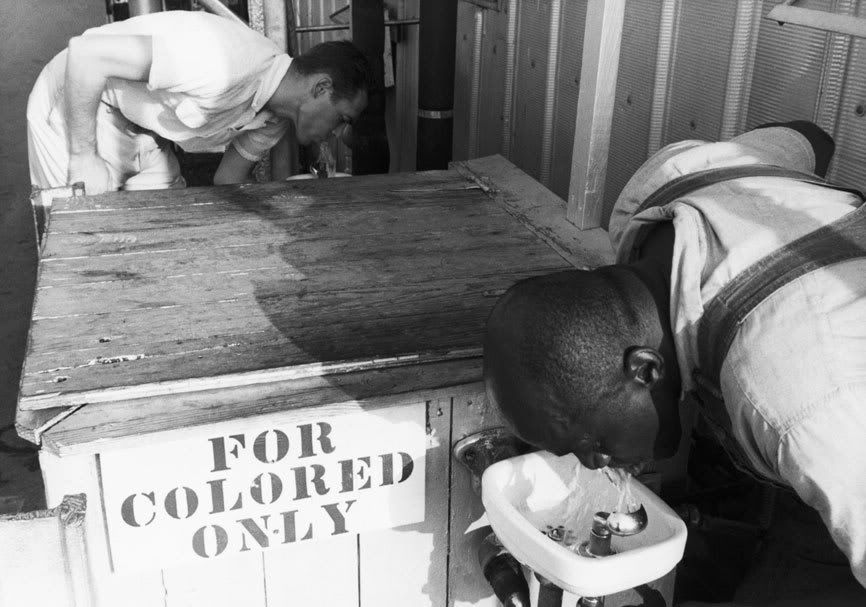
Tuesday, July 03, 2007
3rd American Soldier Charged in Murder of an Iraqi Civilian
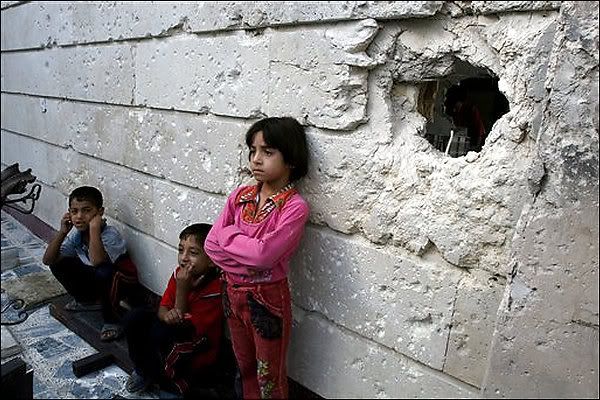 Iraqi kids stand by their damaged house in the Shiite enclave of Sadr City Saturday, June 30, 2007. U.S. soldiers killed 26 suspected insurgents before dawn Saturday in Baghdad's Sadr City neighborhood, the military said. Iraqi police and hospital officials said the victims were civilians killed in their homes. (AP Photo/Karim Kadim)
Iraqi kids stand by their damaged house in the Shiite enclave of Sadr City Saturday, June 30, 2007. U.S. soldiers killed 26 suspected insurgents before dawn Saturday in Baghdad's Sadr City neighborhood, the military said. Iraqi police and hospital officials said the victims were civilians killed in their homes. (AP Photo/Karim Kadim)The New York Times reports:
A third American soldier has been charged with murdering an Iraqi civilian and planting a weapon in a shooting that the soldiers tried to cover up, the United States military said Monday.
The soldier, Sgt. Evan Vela, of Phoenix, Idaho, served in the headquarters unit of the First Battalion, 501st Infantry, of the 25th Infantry Division, based at Fort Richardson, Alaska. That is the same unit as Staff Sgt. Michael A. Hensley and Specialist Jorge G. Sandoval Jr., who were charged last week with killing three Iraqis and placing weapons near their bodies to make it seem as though they were combatants.
Sergeant Vela is charged with one count of premeditated murder, and also of placing a weapon with the body, obstruction of justice and making a false statement, according to a statement by the military.
The killings happened near Iskandariya, south of Baghdad, between April and June, the military said in a statement. All three soldiers have been detained and are awaiting trial.
The military said two soldiers and one marine were killed in western Anbar Province on Sunday, in addition to two soldiers whose deaths were reported earlier. Those follow 101 American military deaths in June, according to figures from the Iraq Coalition Casualty Count, making the 331 fatalities from April through June the deadliest quarter yet for United States forces.
In Diyala Province, the scene of heavy recent fighting between Sunni militants and American forces, an Iraqi police official in Muqdadiya said the civilian death toll from terrorist attacks in the Sherween area on Sunday night had reached 16, with 30 wounded. However, Maj. Gen. Abdul Karim al-Rubaie, the Iraqi commander of operations in Diyala, said coalition and Iraqi forces had made significant advances during the recent large-scale operation to clear Al Qaeda from Baquba.
“The terrorists even targeted schools, as they wanted to halt the progress of science in these areas,” he said Monday. “Life has gradually started to go back to normality in these areas, and residents were happy with the military operations.”
In Baghdad, Brig. Gen. Qassim Atta, an Iraqi military spokesman, said the security crackdown there had led to a reduction in attacks on civilians but an increase in attacks on American-led forces. However, hours later a car bomb in Binouk, a district in northern Baghdad, killed four people and wounded 25, an Interior Ministry official said last night.
Farther south, American F-16s bombed buildings in Diwaniya after insurgents launched 75 rockets and mortar shells at a coalition base. Iraqi officials said the jets killed 10 civilians, including women and children, wounded 30 others and destroyed several houses.
A statement from the United States military said the jets “targeted and bombed the insurgent launch sites.” Accusing insurgents of using civilians as human shields, it said coalition forces were “reviewing the incident to ensure that appropriate and proportionate force was used.”
The strike led to a protest march by residents, some of whom opened fire on a government building, leading to an exchange in which a 17-year-old demonstrator and two security guards were killed.
Sunday, July 01, 2007
2 U.S. Soldiers Charged With Murder of 3 Iraqis
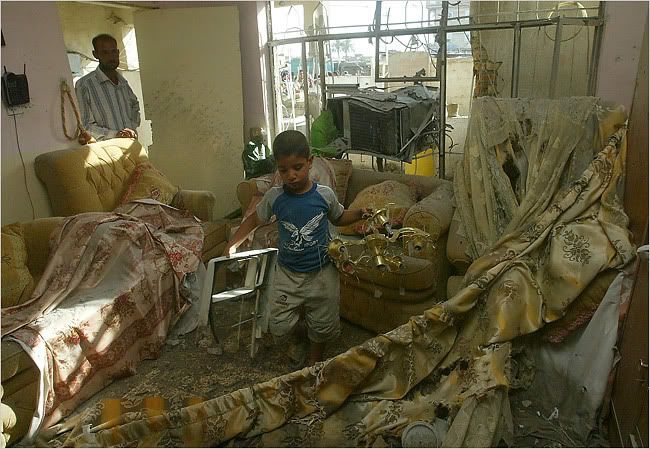 Officials of American-led forces said soldiers killed 26 militants in a raid in Sadr City Saturday, but some residents said civilians were killed. [Kareen Raheem, Reuters]
Officials of American-led forces said soldiers killed 26 militants in a raid in Sadr City Saturday, but some residents said civilians were killed. [Kareen Raheem, Reuters]The New York Times reports:
Two American soldiers have been charged with premeditated murder and planting weapons on dead Iraqis, the United States military said Saturday.
Officials of American-led forces said soldiers killed 26 militants in a raid in Sadr City Saturday, but some residents said civilians were killed.
The soldiers, Staff Sgt. Michael A. Hensley and Specialist Jorge G. Sandoval Jr., were detained after fellow soldiers reported they had been involved in the deaths of three Iraqis near Iskandariya, a stronghold of the Sunni Arab insurgency south of Baghdad, in separate events between April and June this year.
Also on Saturday, the United States military mounted an early morning raid into the Shiite district of Sadr City in Baghdad. Officials with the American-led forces said soldiers had killed 26 militants, but some residents and Mahdi Army militia commanders accused them of killing civilians.
In the murder case, American military officials said Sergeant Hensley, 27, from Candler, N.C., faces three charges of premeditated murder, obstruction of justice and wrongfully placing weapons with the remains of deceased Iraqis. Specialist Sandoval, 20, faces one charge of premeditated murder and one of wrongfully placing a weapon on one of the three Iraqis killed.
Both were serving with the First Battalion, 501st Infantry, of the 25th Infantry Division, which has its headquarters at Fort Richardson, Alaska. Specialist Sandoval was picked up while at home on a two-week leave in Laredo, Tex., the military said. Charges were filed Thursday, and both men are in confinement in Kuwait.
The military said in a statement that an investigation was under way.
The area, part of the so-called Sunni Triangle, is no stranger to controversy.
Two American soldiers have admitted to raping a 14-year-old and killing her and her family in Mahmudiya, a town near Iskandariya, in March 2006, and others also face trial in the killings. Tension has been high since May 12, when an insurgent ambush on a patrol near Mahmudiya killed four American soldiers and one Iraqi, and led to the abduction of three Americans. One soldier’s body was later found but the other two soldiers are still missing.
In Baghdad, Lt. Col. Christopher Garver, an American military spokesman, said the raid in Sadr City on Saturday was against a militant cell that was smuggling weapons, explosively formed penetrators, a particularly lethal type of bomb, and money from Iran to aid Iraqi militias.
He said soldiers killed about 26 fighters and detained 17 suspects, but came under attack from small arms, rocket-propelled grenades and roadside bombs as they withdrew from the area. The Americans returned fire against militants shooting from behind buildings and cars.
“Everyone who got shot was shooting at U.S. troops at the time,” Colonel Garver said. “It was an intense firefight.”
But Iraqi officials said that the death toll was much lower, around eight, and some said that civilians were killed, including a man, his wife and their daughter, who had left their home to check on the disturbance.
Sadr City residents said the American operation was directed at more than one part of the district. Abu Jamal, 50, said he heard troops outside his house in the Sabee Qusoor area early in the morning.
“We were sitting on the roof, all of a sudden the helicopters started throwing flares,” he said. “We were afraid, so we left and went downstairs. The whole family went into one room because we started hearing the sound of firing from the helicopters. We couldn’t hear any firing from machine guns, only the aircraft firing. It was a horrible night.”
In Najaf, a spokesman for the anti-American cleric Moktada al-Sadr, the nominal leader of the Mahdi Army, condemned the raid Saturday and insisted that the militia was not involved in the fight.
“We reject these repeated assaults against civilians. The allegation that Mahdi Army members were the only ones targeted is baseless and wrong,” said the spokesman, Sheik Salah al-Obaidi. “The bombing hurt only innocent civilians.”
The battle prompted an immediate statement from the office of Prime Minister Nuri Kamal al-Maliki, saying that he would demand clarification from the military.
On the political front, Mr. Maliki appealed for Iraq’s largest Sunni bloc, the Iraqi Consensus Front, to end its boycott of his Shiite-dominated government. The boycott began last week as a protest of an arrest warrant issued against one of its members, Culture Minister Asad al-Hashimi, in a murder investigation.
Mr. Maliki said boycotts would only “complicate” matters, and urged them to embrace dialogue as “the only way to solve all the problems now and in the future.”
In Diyala Province, a suicide bomber killed three police recruits and wounded 34 lined up outside a police station in Muqdadiya.
Meanwhile, the American military said it killed Abu Abdel Rahman al-Masri, a senior figure in Al Qaeda in Mesopotamia, in a raid east of Falluja on Friday. Colonel Garver said that Mr. Masri, an Egyptian, had worked closely with Abu Ayyub al-Masri, the military leader of the group, and that his body had been identified by known associates.
American commanders also said that on Friday night a tip from an Iraqi led them to a grave containing dozens of bodies near Ferris, 20 miles south of Falluja. The military said in a statement: “Coalition forces uncovered 35 to 40 bodies at the site. The remains were bound and had gunshot wounds. This incident is currently under investigation.” It is unclear when or how the victims were killed.
Separately, an American command sergeant major, the most senior enlisted member serving in a major command, was sentenced to four months in detention after being convicted of possessing alcohol and pornography, engaging in an inappropriate relationship with a female soldier in his unit, and maltreating a soldier.
The command sergeant major, Edward Ramsdell, of the 411th Engineer Brigade, was working in Diyala Province at the time, and he was given a court-martial in October. Prosecutors said he had possessed a “large quantity” of alcohol and pornography in his quarters, tried to conceal the evidence when discovered and then tried to escape from investigating officers.

